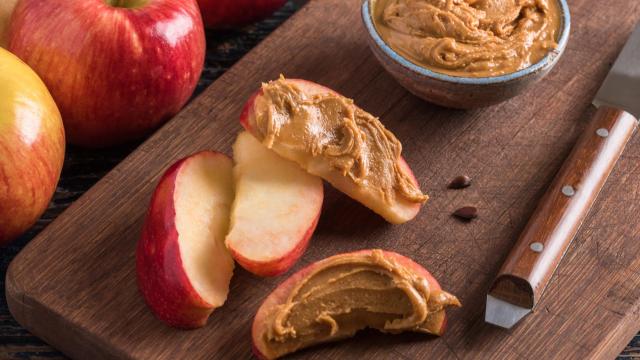When you’re exhausted, it can feel almost impossible to pay attention to nutrition. As hard as it can be, though, the foods we eat play an important role in helping maintain our energy levels.
“When you’re tired, your body craves sugary carbs such as desserts and processed snacks, since eating those foods releases a dose of serotonin,” said Natalie Rizzo, a registered dietician based in NYC, who works with athletes. “Reaching for sugary foods when you’re tired may give you a short-term mood boost, but it will eventually lead to an energy crash.”
When life gets busy and your energy is starting to lag, here are some of the best foods that can help you give sustained energy, along with some of the quickest, easiest ways to fuel your body.
Foods with a low glycemic index help avoid blood sugar crashes
Your body uses refined carbohydrates fast (think processed foods like desserts, sodas, and baked goods made with white flour). Sugars, also known as simple carbohydrates, can be found in both whole foods and processed foods. In recent years, instead of talking about “simple” versus “complex” carbs, there’s been more of an emphasis on a food’s glycemic index, which is a measure of how quickly it changes your blood sugar levels. The higher a food’s glycemic index, the faster it affects your blood sugar, which in turn can have a negative effect on your energy levels — as a blood sugar crash will leave you feeling tired.
The big difference is that whole foods like fruits tend to have a lower glycemic index than their highly-processed counterparts, despite having similar amounts of simple carbohydrates. For example, a medium apple has 15g of sugar — equal to a tablespoon of sugar — but unlike table sugar, an apple’s average glycemic index is only 40, which means that it offers a much more stable and lasting energy boost.
“It’s best to avoid foods with added sugar when you’re exhausted, as those foods will lead to a quick energy spike, followed by a crash,” Rizzo said. “You’ll end up feeling even more tired.”
Protein and fibre will help you feel full longer
Although protein has no effect on your blood sugar, it can help you feel fuller for longer. The same is true for fibre. Opting for minimally-processed foods like whole-grain breads or oatmeal is a good call.
Look for “healthy” fats
Fats are essential for providing our bodies with energy. Generally speaking, you want to limit saturated fats in your diet, the main source of which are derived from animal sources like beef, pork, and full-fat dairy. Although these can be part of a healthy diet in moderate quantities, too much can have a number of adverse effects on your cardiovascular health.
Instead, you can opt for non-tropical plant-based fats, like those found in olive oil, avocados, nuts, and seeds. These sources of fat are high in monounsaturated and polyunsaturated fats, which are heart-healthy.
Go for almonds, walnuts, and pecans
“Just one serving of almonds delivers 6g of natural, plant-based protein, 4g of filling fibre, 13g of unsaturated fat and 1g of saturated fat,” Rizzo said. In addition, almonds have magnesium, which aid in the production of energy in the body and support a healthy immune system.
Go for easy-to-eat fruits like apples, bananas, and oranges
Fruits offer the simple carbohydrates that can help give you energy, but in a form that will lead to a more gradual rise in blood sugar, helping you to avoid an energy crash later. If you’re already tired, reach for the easy-to-eat fruits like an apple or banana. For more protein, fibre, and fat, add peanut butter or almond butter.
Don’t underestimate oatmeal
Oatmeal is easy to cook and has both fibre and protein, which means the energy you get from the carbohydrates will last longer and you’ll avoid blood sugar crashes. As a grad student, I used to make my own oatmeal packets by putting quick-rolled oats in a plastic bag, which I’d cook in the microwave in the lunchroom. For some added flavour, add in frozen berries and nuts.
Go for peanut butter and jelly sandwiches on whole-grain bread
Peanut butter provides heart-healthy fats, protein, and fibre, while whole-grain bread has fibre and protein, which offer longer-lasting energy.
Mix yogurt and fruit
Mixing plain yogurt with whatever fruit you have on hand (bananas, berries, mango, or whatever else you like) will give you protein for satiety, along with long-lasting energy from the fruit. One easy way to always have fruit on hand is to buy frozen, which keeps for a long time.
Dip pre-sliced veggies in hummus
Hummus has a mixture of fibre and protein, while veggies have fibre and a lot of extra nutrients. To make things easy on yourself, opt for pre-sliced veggies, like a bag of baby carrots or a veggie platter.
Indulge in cheese and whole-grain crackers
This snack can be as simple as grabbing some string cheese out of the fridge and eating it with whole-grain crackers from the pantry. The cheese will provide some protein, while the whole-grain crackers provide fibre and carbs for longer-lasting energy.

Leave a Reply
You must be logged in to post a comment.